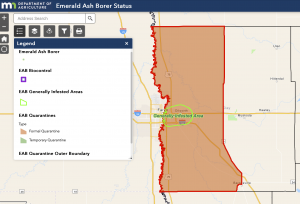It’s 6:10 a.m. on Nov. 18, and 38 cadets break into a chorus of “Happy Birthday” as they tread water in the pool at MSUM’s Nemzek Hall. They are part of NDSU’s Army Reserve Officers’ Training Corps program, and they are warming up to take their annual Water Combat Safety Test.
Lt. Col. Shawn Stroud said that cadets must pass the test each year to ensure that officers are able to survive and function in the water in an emergency situation. However, he also believes that it fulfills an important part of their training to be future military leaders.
“Part of leadership is being able to operate outside of their comfort zone,” he said.
Because of the tri-college system, many of NDSU’s ROTC cadets are actually Concordia or MSUM students. They may graduate with any major they choose and an additional minor in military science. Before they can graduate, however, they have to pass certain assessments of their physical ability and leadership skills, and they are ranked against every other ROTC graduate in the country on what is known as the Order of Merit List. Only the top 10 percent of those on the list are guaranteed to get any selection they want of military jobs.
After treading water in swimsuits, the cadets leave the pool to put on their uniforms, substituting tennis shoes for their normal combat boots. According to Stroud, this is in an attempt to keep MSUM’s pool clean. The rest of the test is completed in full uniform.
In order to pass the test, the cadets have to swim 50 meters in their full uniforms, swim across the pool with an M16 held above their head in one hand, jump into the diving well of the pool with a vest of equipment and remove the equipment before resurfacing, and be pushed off the five-meter diving board while holding an M16—blindfolded.
Jonathan Lunde, a NDSU senior who was acting as Cadet Safety Officer for the day, said that he enjoyed the test when he took it in past years.
“I thought it was a lot of fun,” he said. “I grew up on a lake, so I thought it was pretty easy.”
Not all of the cadets were as comfortable in the water as Lunde. Some had little or no aquatic experience before joining ROTC and for many, certain parts of the test were nerve wracking.
“I’m terrified of water,” said Nelson Godbolt, a cadet from Concordia.
Concordia sophomore Rachel Campion said that being blindfolded was the hardest part for her. She also said that the cadets usually try to get through the test like any other part of physical training.
“You just do it,” she said.
For many of the cadets, the test is part of preparation for a program called the Leadership Development Assessment Course, which evaluates each cadet’s abilities as both a leader and a follower. The program will take place at Fort Lewis in Washington this summer and includes additional aquatic safety tests.
Steven Jaskowiak, a senior at Concordia who was the score-taker for the test, said that remaining optimistic is the most important skill in getting through the rigorous month-long program.
“I figured the time went faster if you kept a positive outlook,” he said. “But at the same time, it’s a test, not training.”
All cadets have to complete LDAC in order to continue with the ROTC program.
Maj. Scott Ewen, who works with all the cadets at NDSU, thinks that the environment of ROTC is beneficial because the cadets learn to deal with dangerous situations that require snap decisions in a safe, controlled environment where they can’t be hurt. He said that is part of the reason that tests such as the Water Combat Safety Test are administered: so that the officers have both the skills and confidence to meet these situations if they ever arise in the line of duty.
“If you’re going to make decisions here, it’s the right place to do it,” he said.
As the cadets finish treading water in the pool on the morning of the test and prepare to dress for the rest of their assessments, Stroud comments that no one seems to be tired or scared yet—a good sign when the water treading is done.
“That major hurdle’s over,” he says. “No one’s drowned so far.”







Be First to Comment